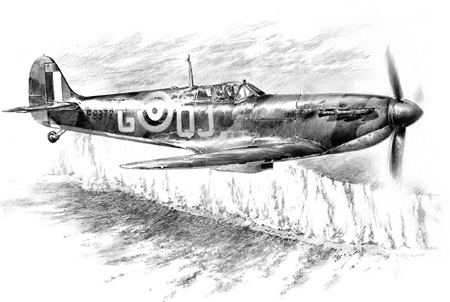It was seventy years ago today that the Battle of Britain officially began.
It’s hard to remember, but seventy years ago today – within the lifetime of a huge number of Americans -Western Civilization itself was on the ropes, and the Nazis commenced what they hoped would be the endgame.
It was that bad.
———-
It’s hard to imagine to us, today, engaged as we are in a counterinsurgency war that is very nearly a decade old, how different war was in 1940 than today. It was very, very fast, in the same way that we conquered Hussein’s Iraq very, very quickly, with huge armored columns sweeping across the plains and clouds of aircraft pummeling opposition far behind the increasingly-meaningless “front line”. And remember – it had been ten scant months since Hitler had conquered Poland, three months since the lightning campaigns in Denmark and Norway (where the Allies had finally pulled out seventy years and one month ago today on June 10, 1940); not quite two months since Hitler had conquered the Netherlands and Belgium; less than a month since France had capitulated.
In four months – less time than it takes to get through the Stanley Cup playoffs – all of Western Europe, save Switzerland (which watched the Germans warily from their mountain fortresses, mobilized for war on the one hand and needing to accomodate a power that completely surrounded them on the other), Sweden (also ready for war, also surrounded by German or German-allied territory), Spain (where Francisco Franco remained friendly to his benefactor Hitler, while studiously avoiding entering a war he realized would gain him nothing) and Germany’s ally Italy, had fallen.
It was also incredibly bloody by our standards today. The six weeks between the invasion of the Low Countries and the surrender of France led to 65,000 French killed and missing;
Britain lost nearly 20,000 dead and captured and twice as many wounded; the Dutch lost nearly 10,000 dead and wounded in two weeks, the Belgians twice as many in about a month. The Germans lost 27,000 dead conquering France, with at least as many wounded. And the victory, crushing as it was, cost about a third of the strength of the German air force, the Luftwaffe. That’s over 100,000 dead, not counting civilians, in less time than it takes for your tax refund to arrive if you file by mail.

So when German troops lined up along the English Channel, the big question was “what now?” The obvious answer was “invade Britain”.
But this hadn’t been done successfully since 1066; in the nine hundred years since, Britain had built the world’s most powerful Navy, which if left to operate with impunity would shred any invasion attempt…
…unless it was impossible to operate because of crushing German air superiority.

This was a novel, radical change in warfare even since World War I, 22 years earlier; the idea that there was a third front, the sky, that could control movement on the land and sea and make it impossible to successfully resist. It was complete German control of the air that hamstrung Poland’s resistance, that gave Germany’s shoestring invasion of Norway the advantage it needed, that drove the Dutch to surrender, that finally doomed France. Because Germany controlled the skies, Stukas broke up French counterattacks and troop concentrations as German fighters mowed French bombing counterattacks down like sheep.
And the Germans knew they’d have to control the sky over Great Britain to have a chance of holding the Royal Navy at bay long enough to get ashore in Britain to face what might have been an anticlimactic battle against a British army that had left most of its equipment in France while evacuating from Dunkirk.
Hitler knew he needed to capitalize on his momentum. He also needed to give the exhausted Luftwaffe time to recover, bring in new pilots and planes to replace casualties, and start over again, and give his Navy time to muster enough ships and barges to carry an army cross the Channel, especially after the grievous casualties they’d suffered in Norway over the previous three months.
So the Luftwaffe‘s first mission, which would occupy the first month of the Battle of Britain, scarecely touched British soil at all.
———-
So as fraught as the date and the events were, the Battle of Britain started with a bit of a whimper. The Luftwaffe was exhausted from the Battle of France – and so, to slow down the tempo and allow for training replacement crews, the first month of the Battle was spent sparring over the English Channel.

Stukas, with powerful fighter escorts, descended on British convoys through the Channel. The British being on defense, they had to try to cover all the convoys equally; being at the limits of the ranges of the Spitfires and Hurricanes that stood the patrols, the British advantage in radar (of which more in a month or so) was of little value.

And so the two air forces spent the month like a couple of boxers in the first round, poking at each other, feeling out each others’ games.

For the merchant ships and the Royal Navy in the Channel below, of course, it was another matter; casualties in this first month became so heavy that the Admiralty stopped all convoy shipping in the Channel.

And so the first phase of the final battle for the future of western civilization went to the Germans by a close nod.
But things would pick up in August.
Leave a Reply
You must be logged in to post a comment.